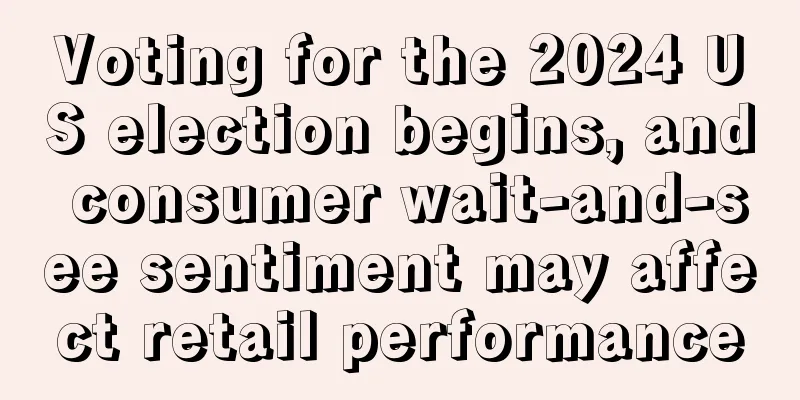Voting for the 2024 US election begins, and consumer wait-and-see sentiment may affect retail performance

|
It is learned that the 2024 US presidential election day officially started on November 5th local time. It is understood that according to data from the University of Florida Election Laboratory, as of the morning of November 4th local time, more than 78.02 million voters across the United States have voted early. The candidates for this year's US presidential election are Democratic candidate and current Vice President Kamala Harris and Republican candidate and former President Donald Trump. The American media generally believes that the 2024 election will be the most stalemate presidential election in recent years. With the closing of the first polling stations at 18:00 EST on Tuesday, the election entered the countdown stage, and the final polling station will close at 01:00 the next morning. The election results are attracting much attention, and during this period, US consumers' retail spending has also felt the pressure of election uncertainty. Many consumers will reduce large non-essential consumption on the eve of an election, and this phenomenon is particularly evident when the election situation is tense and future economic policies are unclear. According to Elizabeth Marsten, vice president of business media at performance marketing agency Tinuiti, although consumer spending has not declined significantly, consumers' cautious attitude is enough to affect the performance of retail brands. Marsten noted that during Amazon's Prime Day event on Oct. 8 and 9, average order value was down about 12% from last year. Among them, sales of clothing, electronics, and home and garden supplies fell the most, and the slowdown was mainly attributed to "deal fatigue", that is, consumers' enthusiasm for promotions has waned. In order to achieve the sales target of the same period last year, the brand's investment in retail media increased significantly. However, the average cost per conversion increased by more than 25%, causing a significant drop in return on advertising spend, further increasing brand pressure. In addition, discretionary spending categories such as building materials and luxury goods also saw a slowdown. Jason Goldberg, chief strategy officer at Publicis Groupe, said advertising budgets remained stable overall, but political advertising was concentrated during elections, intensifying the competition for consumer attention and pushing up the cost per conversion of retail advertising. Market observers generally believe that the future recovery of consumer confidence will depend on whether policy uncertainty is alleviated after the election results are announced. Author ✎ Rayna/ Statement: This article is copyrighted and may not be reproduced without permission. If you need authorization, please contact: happy |
>>: Mexican version of Black Friday: Amazon starts shopping early on November 12
Recommend
What is MuCharm? MuCharm Review
MuCharm is a cross-border e-commerce APP under Adw...
Demand for fashion and beauty products in the United States is "rejuvenating"! Sales will peak in December
According to a survey by NPD Group, in addition to...
Peak season strike risk lifted! UPS's new contract with employees has been approved!
It is learned that according to foreign media repo...
Rare! Amazon suddenly warned that a large number of sellers may be banned from selling
Recently, many sellers have reported that they hav...
What is Haiyi Overseas Warehouse? Haiyi Overseas Warehouse Review
Shenzhen Haiyi Overseas Warehouse Technology Co., ...
Walmart+ membership exceeds 32 million! Competition with Amazon Prime intensifies!
It is learned that according to Deutsche Bank data...
Sellers must read! Amazon US has updated its bundling policy again
text Recently, Amazon US has once again updated i...
Best Buy implements new round of layoffs and business restructuring
It is learned that according to foreign media repo...
What is Rufavor? Rufavor Review
Harbin Russia Best E-Commerce Co., Ltd. (Russia Be...
What is LianLian Link? LianLian Link Review
LianLian Link cross-border e-commerce service mark...
What is the Chengdu Cross-border E-commerce Association? Chengdu Cross-border E-commerce Association Review
Chengdu Cross-border E-commerce Association (Engli...
What is MavSocial? MavSocial Review
MavSocial allows you to monitor all your social me...
Inflation is high, but US e-commerce is growing instead of decreasing! Who is buying?
The United States has seen the highest inflation l...
US chip bill passed! Will chip shortages hit 3C sellers soon?
It is learned that according to foreign media repo...
Costco Q3 financial report released: e-commerce sales soared 20.7%!
It is learned that the US retail giant Costco rece...









